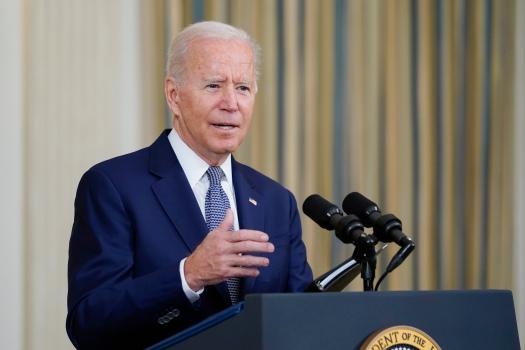The Next Big Thing, Biden’s Democracy Summit: Expectations vs Reality

Joe Biden, President of United States of America
Taona E Mwanyisa
President Joe Biden was sworn in as the 46th president of the United States of America (USA) following fiercely contested elections in November 2020. His ascendence to the highest office in the USA was marred by allegations of electoral malfeasance by then President Donald Trump.
Consequently, riots instigated by President Trump’s supporters, ensued on January 6th, 2021, with rioters storming the US Capitol building demanding an overturn of the election result. These events have put America’s democratic institutions under the spotlight on how they respond to internal strife.
Whilst America’s democratic standing at home was being challenged, democracy across the globe declined with the advent of the Covid-19 pandemic. Democratic gains are being eroded especially in Africa and Asia. It is against this background of national and international democratic deficits, that President Joe Biden is proposing the international Summit for Democracy that brings together the world’s democrats with the hope of strengthening democratic institutions and confronting nations that are backsliding and hopefully forcing a common ground. The Summit is anticipated to bring together heads of state, key private sector actors, leading CSOs on the frontline of defense of democracy and tech giants.
Biggest democracy challenges
In convening such a summit President Biden is confronted with several challenges at home and abroad. To begin with, the events leading to and after the American elections did not reflect well on the state of democracy in the country.
The events provided many, especially the rogue democracies, with reasons to question America’s role as the leading champion of democracy globally. In addition, the increasingly isolationist and inward-looking policies of Donald Trump opened space for autocratic rulers to fill the void left by the USA and consequently gained traction in countries with weak democracies. China and Russia were left to consolidate their influence on Africa, and Asia.
The return of America to multilateral international affairs, following Biden’s electoral victory, will not be viewed favorably by the two countries, which poses one of the biggest challenges the summit will face. Based on this programmatic understanding of the state of democracy in the world, President Biden is confronted with the task of how to be inclusive and provide for the participation of states that are not part of the big family of participatory democracy.
Understandably, the invitation list is now being questioned and whether genuine dialogue will ensue after the invitation of authoritarian leaders such as President Rodrigo Duterte of the Philippines to the summit.
Addressing this polarisation will be key for the success of the summit especially considering the emerging events surrounding the arrest and detention of leading Russian pro-democracy leaders such as Mr. Alexei Nalvalny, the tensions in the East China Sea, and events in Hong Kong and other declining democracies. Getting countries such as Russia and China to sit at the table to discuss the state of global democracy is critical but an uphill struggle. Backsliding nations will seek to align themselves with Russia and China to secure support as scrutiny on their state of democracies increases. This will further strain relations among these adversaries.
Democratic backsliding has been observed globally in the areas of representative government, fundamental rights, checks and balances, and impartial administration. The democratic gains of the past two decades are eroding for both old and new democracies as the democratic performance and quality of many third world democracies remain weak as highlighted in The Global State of Democracy 2019 report.
The report further notes that the share of weak democracies is rising and remains fragile in some transitional contexts. Furthermore, civic space has not been spared as it has been shrinking at alarming rates and the non-adherence to the principles of the rule of law is on the increase. In addition, the world has seen a rise in populism partly spurred by the rhetoric of Donald Trump, the swing to the right in the EU, political and economic factors that are negatively affecting the state of democracy in the world.
The Covid-19 pandemic has compounded the shrinking democratic space and has regressively impacted democratic gains in several emerging democracies. The world has witnessed overreaching in the application of the provisions of the state of emergencies designed to curtail the spread of the virus. This is more pronounced in countries with pre-existing democratic challenges such as in some European, African, and Pacific countries.
The advent of Covid-19 has also seen the emergence of electoral autocrats who are using the state of emergencies to curtail civil liberties as well as for term elongation. Suffice to say, whilst these challenges are significant, they are not insurmountable. The prioritization of democratic challenges arising from covid-19 induced democratic backsliding by the summit is critical. It is also important to acknowledge the economic inequalities that have been brought to the fore by the Covid-19 pandemic and its unintended consequences on the state of democracy in the world.
Despite the doom and gloom opportunities are still there to arrest the democratic backsliding witnessed in the last decade. The summit offers a real opportunity to further consolidate these gains and halt the backsliding witnessed in the past five years. The summit should focus on securing increased funding for pro-democracy projects in fragile states.
Taona E Mwanyisa is a democracy, governance, and specialist in election-related assistance to electoral management bodies, political parties, civil society organizations, civil registries, and law enforcement agencies. He can be reached on tanyaona@gmail.com; https://twitter.com/taotami
